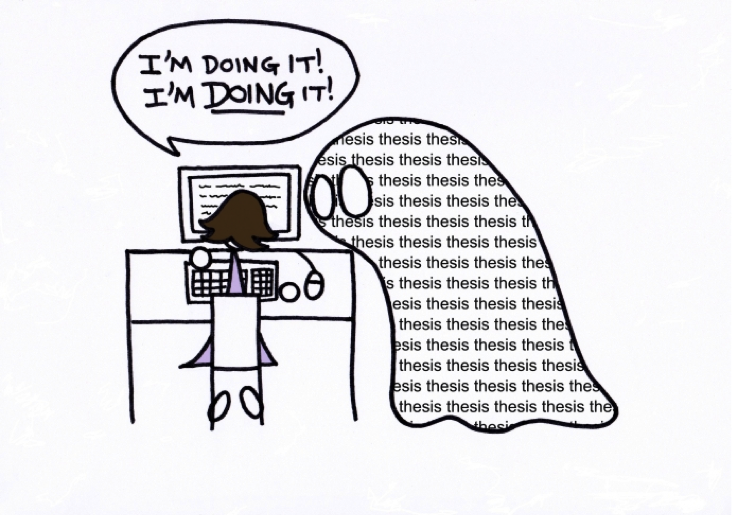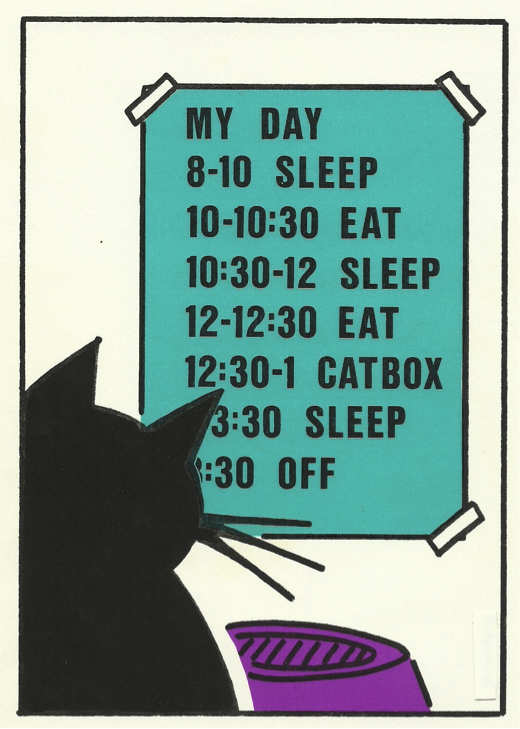So you’re interested in a thesis! Perhaps you see yourself pursuing a PhD down the road, or a specific area of education speaks so loudly to you that you feel intrinsically nudged towards investigating and developing it. Something I have learned as I have been preparing to begin work on my thesis is that you must be passionate about it; you are going to spend countless hours reading articles, sorting ideas, writing proposals, and performing research, and the only thing (aside from caffeine) that will keep you going is your inner passion and motivation. Make no mistake, the thesis route is not for the faint of heart, but if you’re up for the challenge, it can also be immensely rewarding, both personally and professionally.
Note: if you are considering PhD down the road, it is strongly advised that you consider taking the thesis or MRP route. Many PhD programs will not accept students who have chosen the Research Project and Seminar route, as it does not demonstrate the skillset required at the PhD level. Alternatively, they may ask you to submit a Qualifying Research Paper in order to demonstrate the skillset.
Setting out from the Shire
My journey towards a thesis began before I even began my courses. Knowing that I was interested in pursuing graduate work, I began researching topics of interest nearly a year before beginning the MEd. Initially, I thought I was going to be investigating students who are gifted, and I read through several prominent books to get a snapshot of the current educational landscape. However, as I soon learned, there is a certain organic quality to research, and nothing was really speaking to me in that field. Shortly afterwards, I read a particular article linking gifted students to another field, and I happily switched tracks.
I met with my supervisor in April 2014, and was given several articles and books to read to help prepare myself over the summer. Having done this, I strongly recommend early research for anyone considering thesis. Some great books to start with are listed below. Touch base with your faculty advisor ASAP, and begin reading about your chosen area of interest. The sooner you begin reading and internalizing the theories and methods that will inform your research efforts, the better. I have had experiences while preparing for ethics where I’ve said, “Wait a minute, I just need to find that article I read back in May about such and such, and it’ll all get neatly tied together!” There is so much theoretical history to any given topic, and the depth of your knowledge will shine through in your writing.
Michelann recommends familiarizing yourself with a few websites and texts that will help you make the ultimate decision of whether to write or not write a Thesis or MRP:
Texts:
**Kamler, B., & Thomson, P. (2014). Helping doctoral students write: Pedagogies for supervision. New York, NY: Routledge.
Murray, R. (2011). How to write a thesis (3rd ed.). New York, NY: McGraw-Hill Open University Press.
Oliver, P. (2014). Writing your thesis (3rd ed.). Thousand Oaks, CA: Sage.
**Roberts, C. M. (2010). The dissertation journey: A practical and comprehensive guide to planning, writing, and defending your dissertation research (2nd ed.). Thousand Oaks, CA: Corwin: A SAGE Company.
And once you’ve made the decisions, check out these websites (in addition to our great blog!) for support:
American Pyschological Assocation gradPSYCH: A digital magazine aimed at graduate students. Available at: http://www.apa.org/gradpsych/index.aspx
GradHacker: A collaborative blog and ‘bootcamp’ program that spans universities and programs. Available at: http://www.gradhacker.org/about/mission-statement/
Dymystifying Dissertation (Inside Higher Education): A series of articles designed to move you from the initial stages of brainstorming to putting the final touches on your dissertation.
Available at http://www.insidehighered.com/career-advice/demystifying-dissertation#sthash.de12O0NI.dpbs
The Thesis Whisperer: A blog newspaper dedicated to the topic of doing a thesis edited by Dr. I. Mewburn, Director of research training at the Australian National University. Available at thesiswhisperer.com
Don’t forget to come up with an organization system for your readings so you can quickly access them later. I have them saved in my computer both under specific file folders and also in Mendeley. Mendeley is a great citation tool and organizer for your references, and is available for free as a desktop and mobile app.
Encounters with Ethics
Don’t let the ethics form fool you … it may look like a simple check-box system with a few paragraphs for writing, but it is a very rigorous process. It took me about a month to put together my ethics proposal, and that was with the literature review and research proposal for my methods class already complete.
Once you submit, you have to wait 6-8 weeks for it to be returned with revisions…if you make those revisions within 24-48 hours, you’ll likely make the next deadline for submission. Even experienced, tenured professors have to go through several rounds of revisions, so anticipate waiting several months before you are able to proceed with your research.
If you are performing research within a board of education, make sure that you have the go-ahead before entering ethics, and take a look at some of the board-specific forms you are to sign. Financial Considerations
Financial Considerations
Woo hoo, thesis work! That means I don’t have to buy books for courses!
Hang on there, sparky. Now that you’ve budgeted several months worth of time for the ethics process, have you budgeted your resources for once you hit the pavement and start your data collection?
Unless you have a grant, or are working with an organization providing funding (which would need to be disclosed for ethics), you will be paying for your thesis out of your own pocket.
In my case, the board where I reside is not currently accepting new research, they’re already saturated with researchers and they can’t allow any more projects. So I had to look elsewhere, and the school in which I will eventually be working in is approximately 1 hour and 45 minutes away. Not only do I have to consider how this will impact the frequency of my data collection, I also have to consider vehicle rental costs (as I don’t currently own a vehicle). It’s a balancing act … too few times at the school could mean I don’t get enough information, but going down too frequently would drain both my energy and my finances. This is where my passion comes in; ultimately, I think the work that will arise out of this project is worth the cost of my time and money, so I see it as an investment as opposed to simply expenditure.
Waiting in Limbo
Now that my ethics proposal is submitted, all I can do at this point is fine tune my research procedures, continue to read up on my topic, and savour the excitement of starting new courses in the winter term. It’s also the perfect time to practise something that grad students are particularly poor at: self care. Although I still have some research commitments, this month I’ll be able to relax, get caught up on sleep, exercise, and hopefully try to start putting a health routine together (just in time for ethics to come through and completely derail it). For me, balance doesn’t necessarily mean that I’m providing ongoing self-care when I get super busy, but it does mean that I allow myself the luxury of a few days entirely to myself as a reward for when I finish.
On that note…
This blog will be taking a Holiday Hiatus. Have a beautiful, merry, and light-filled holiday season with your nearest and dearest, and we’ll see you again in January!
Written by Marianne Vander Dussen, verified by Michelann Parr.




